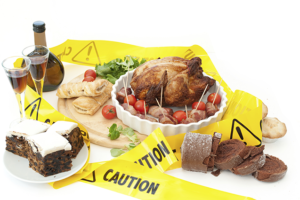Don’t wash the turkey and other tips to stop your Christmas becoming a recipe for disaster
Media release:19 December 2014
The Australian Food Safety Information Council today launched their food safety tips for the holiday period including a warning to consumers to be especially careful with raw egg dishes and poultry.
Dr Michael Eyles, Council Chair, said that our risk of food poisoning increases around Christmas time as our entertaining activities increase, the weather gets warmer and food poisoning bacteria can grow quickly in many foods.
‘Christmas celebrations often include several generations of family including the very young, pregnant women, the elderly and those with poor immune systems who can become very ill if they do get food poisoning. Also you cater for larger numbers of people – putting a strain on your fridge and possibly creating a recipe for disaster at Christmas,’ Dr Eyles said.
‘Recent research by the ANU found a 13% increase in Campylobacter and a 24% increase in Salmonella food poisoning cases over a 10 year period. Campylobacter and Salmonella infections are often linked to poorly handled poultry and raw egg dishes. In addition, OzFoodNet reports about 20% of food poisoning outbreaks investigated in 2011 were linked with raw or minimally cooked egg dishes.
‘The Council’s research has found that 60% of home cooks said they washed whole poultry before cooking. This should not be done as it can spread bacteria around your kitchen onto your hands, kitchen utensils and other foods.’ Dr Eyles warned.
Here are 10 tips to keep your family and friends food safe during the holidays:
- Plan ahead. Don’t buy too much food that won’t fit in your fridge. Make room in your fridge by putting drinks on ice.
- Keep it cool. Transport refrigerated and frozen food from the shops in a cooler bag with an ice brick. Wrap raw meat or chicken in a separate plastic bag or container and put it in the bottom of the cooler.
- Keep it clean. Wash your hands thoroughly with soap under running water and dry thoroughly before handling food and after handling raw poultry and red meat or visibly dirty eggs or vegetables.
- Cook the turkey properly. Turkey, like all poultry, can be a source of Campylobacter and Salmonella food poisoning if not handled correctly. Make sure the turkey is fully defrosted in the fridge or get your supplier to defrost it in their cool room. Don’t wash the turkey before cooking as that will spread the bacteria around your kitchen. Cook it until it a meat thermometer shows it has reached 75°C in the thickest part.
- A ham is for Christmas not for life! Your Christmas ham will keep several weeks with proper handling. After reading the packaging labels, remove it from its plastic wrap, cover it with clean cloth soaked in water and vinegar so it doesn’t dry out, and store it in the fridge below 5°C. Reduced salt hams are now becoming popular but will not last as long as conventional hams so think how much you are going to use in the next week or so and freeze some for later.
- Raw eggs are a risk. Try to avoid raw or minimally cooked egg dishes, such as in raw egg mayonnaise or fancy desserts, which can be a particular risk for food poisoning.
- Cooked rice and pasta are also a food poisoning risk if not refrigerated – a recent survey found 22% of people would leave rice on the bench top overnight – so don’t forget to refrigerate the pasta or rice salad
- Replace dips. Don’t leave dips out for hours, put out small amounts and replace from the fridge every hour or so.
- Keep salads and desserts refrigerated and serve up just before you eat them, returning leftovers to the fridge.
- Refrigerate leftovers straight away. With the Christmas leftovers its important not to leave them unrefrigerated – as soon as the cooked food has stopped steaming divide it into into small containers so it will cool quickly and refrigerate or freeze immediately. Use up refrigerated leftovers within 3 days and make sure your fridge is running at 5°C or below. Write the date you froze them on the container. Always reheat leftovers to 75°C in the centre to kill any food poisoning bugs
For more information see our Food safety at Christmas advice
Media contact:
Lydia Buchtmann, Food Safety Information Council, 0407 626 688 or info@foodsafety.asn.au
The Food Safety Information Council is Australia’s leading disseminator of consumer-targeted food safety information. It is a non-profit entity supported by state and territory health and food safety agencies, local government, and leading professional, industry and community organisations.
The Council aims to address the estimated 4.1 million cases of food poisoning in Australia each year resulting, on average, in 31,920 hospitalisations, 86 deaths and 1 million visits to doctors each year.

